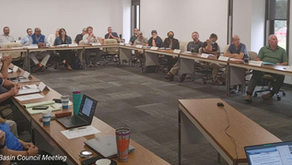Environmental Lawsuit Asserts Going Fishing Requires an NPDES Permit
- JD Solomon
- Sep 11, 2023
- 3 min read

The Fourth District Court of Appeals rejected arguments that North Carolina shrimpers violate the federal Clean Water by discharging their bycatch overboard. The three-judge panel affirmed a previous lower court decision from September 2021 that the plaintiffs appealed, the NC Fisheries Reform Group. The most interesting aspect is that such a lawsuit would be filed in the first place.
The Environmental Lawsuit
The NC Fisheries Reform Group argued that bycatch being thrown back into the water is a pollutant. They further argued that disturbing sediment with trawl nets is dredging. The group contended that either requires commercial shrimpers to obtain a Clean Water Act permit.
The Federal Clean Water Act (CWA)
The CWA’s definition of “pollutant” reads, in part: “The term ‘pollutant’ means dredged spoil, solid waste, incinerator residue, sewage, garbage, sewage sludge, munitions, chemical wastes, biological materials, radioactive materials, heat, wrecked or discarded equipment, rock, sand, cellar dirt and industrial, municipal, and agricultural waste discharged into water.” {§ 1362(6)}.
The plaintiff asserts that bycatch is a "pollutant" because it is within what it claims is the ordinary meaning of "biological materials." A "discharge of a pollutant" includes "any addition of any pollutant to navigable waters from any point source." § 1362(12). Putting these definitions together, the theory is that dumping bycatch back into the ocean from a boat after being hauled onboard by nets plausibly amounts to an addition to the ocean.
The Appeals Court Ruling
According to the Court of Appeals, the theory “sounds plausible. And, viewed in isolation, we might well agree. Faced with a statute, we typically determine the text’s meaning based on the ordinary understanding of the language. And considering only the statutory text, (the plaintiff) makes a plausible case for why returning bycatch to the ocean fits within the ordinary meaning of a “discharge” of “biological materials.” Yet, in appropriate cases, we have been instructed to consider, as a background rule, other legal interests that contextually inform our understanding of a statute’s meaning... These background principles influence our reading of a statute, sometimes even moving us to interpret a provision differently than we might otherwise.”
"The Act forbids the unpermitted discharge of a pollutant. Returning bycatch to the ocean is not discharging a pollutant, so throwing it overboard without a permit is not forbidden by the Act,” Judge Julius Richardson wrote in the court’s opinion. “Likewise, because the trawl nets merely kick up sediment already present in the Sound, their use does not discharge any pollutants either. Accordingly, we affirm the district court’s dismissal of the complaint.”
Consequences on Commercial and Recreational Fishermen
The ruling came as an immense relief to all types of fishermen.
Judge Richardson commented that his daughter would be in violation if the plaintiffs’ arguments prevailed if she caught a fish with a minnow and threw it back.
"This is more than being accused of polluting our own waters," said Jeff Styron, whose family business, Garland Fulcher Seafood, is based in Oriental, NC. “That’s the last thing our fisherman want to do – this is where we make our living.”
Where Is the EPA?
“Here, the EPA is not asserting such a power. In fact, it’s not asserting anything since this is a citizen suit between private parties," the court notes. "But the plaintiff is suing precisely because the EPA has not acted. Their suit is designed to compel EPA action.”
Impact of Programs and Major Projects
On the surface, this ruling may not seem relevant to infrastructure programs and major projects. The connection is that the case demonstrates just how silly lawsuits can be. Plus, it's worth reflecting that the suit made it to multiple layers in the court system and the associated costs and time on working people doing their ordinary work. Needless to say, it would have been even more fun had EPA taken an active role in the craziness.
The primary sources for this article are the decision by the Fourth District Court of Appeals and “Court rejects allegations of NC shrimpers polluting waste" (August 25, 2023) by Maureen Donald.
JD Solomon Inc provides solutions for program development, asset management, and facilitation solutions at the nexus of facilities, infrastructure, and the environment. Subscribe for monthly updates related to our firm.




Comments